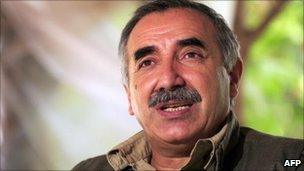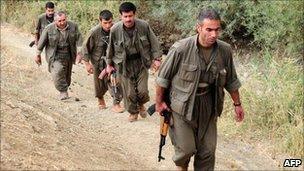PKK 'would disarm for Kurdish rights in Turkey'
- Published

Murat Karayilan said he would order his fighters to lay down their weapons under UN supervision
The leader of a Kurdish rebel group engaged in a guerrilla war with Turkey has told the BBC it is willing to disarm in return for greater political and cultural rights for Turkey's Kurds.
The Kurdistan Workers' Party (PKK) is designated a terrorist organisation by Turkey, as well as the EU and US.
If an agreement were reached, it would bring an end to a 26-year-old conflict.
A Turkish government official said it was "not in the habit of commenting on statements made by terrorists".
Threat
Clashes between the PKK and government forces have flared in the past few months, after the breakdown of a tentative peace initiative.
But the PKK's offer was unequivocal, says the BBC's Gabriel Gatehouse, who met the group's leader Murat Karayilan in the mountains of Iraqi Kurdistan.
Mr Karayilan said he would order his fighters to lay down their weapons, under the supervision of the United Nations, if Turkey agreed to a ceasefire and met certain conditions.
His demands, he said, included an end to attacks on Kurdish civilians and arrests of Kurdish politicians in eastern Turkey.
The group has also been fighting for more linguistic and cultural rights for Turkey's Kurds, which by some estimates constitute one fifth of the country's population.
"If the Kurdish issue is resolved in a democratic way through dialogue we will lay down our weapons, yes. We will not carry arms," he said.
But his offer of peace was accompanied by a threat.
"If the Turkish state does not accept this solution, then we will declare democratic confederalism independently."
A genuine bilateral ceasefire would represent a major breakthrough in the conflict between Turkey and the PKK, which began in 1984 and has claimed the lives of around 40,000 people.
But any unilateral declaration of independence or autonomy would almost certainly be seen as an escalation by the Turkish government from a group which it - and most Western governments - considers a terrorist organisation.
The Turkish government has already eased some restrictions on the Kurdish language, but others remain. It announced it wanted to introduce a comprehensive Kurdish rights package last year, as part of a drive for peace, but the whole effort has stalled under nationalist opposition.
In May, imprisoned PKK leader Abdullah Ocalan said he had given up hopes of dialogue with the government.

The conflict between the PKK and Turkey reached a peak in the mid-1990s
Meanwhile the PKK has stepped up attacks on targets in Turkey, many launched from its bases in Iraqi Kurdistan.
Turkey has over the past few months responded with air strikes and even incursions by ground forces into Iraqi territory. Dozens of people have been killed on both sides.
Both sides say they only target combatants, but each accuses the other of killing civilians.
Turkish authorities have said a pipeline carrying gas from Iran to Turkey was blown up on Tuesday night, interrupting the flow. Agri region Governor Ali Yerlikaya blamed the PKK, though there was no confirmation from the group.
Correction 22 July 2010:
In the original version of this story we quoted Murat Karayilan as saying: "If the Turkish state does not accept this solution, then we will declare independence." We have clarified the translation of this sentence and corrected it to: "If the Turkish state does not accept this solution, then we will declare democratic confederalism independently."
- Published21 July 2010
- Published21 July 2010
- Published3 July 2010
- Published20 June 2010
- Published20 July 2010
- Published6 July 2010
- Published1 July 2010
- Published19 June 2010